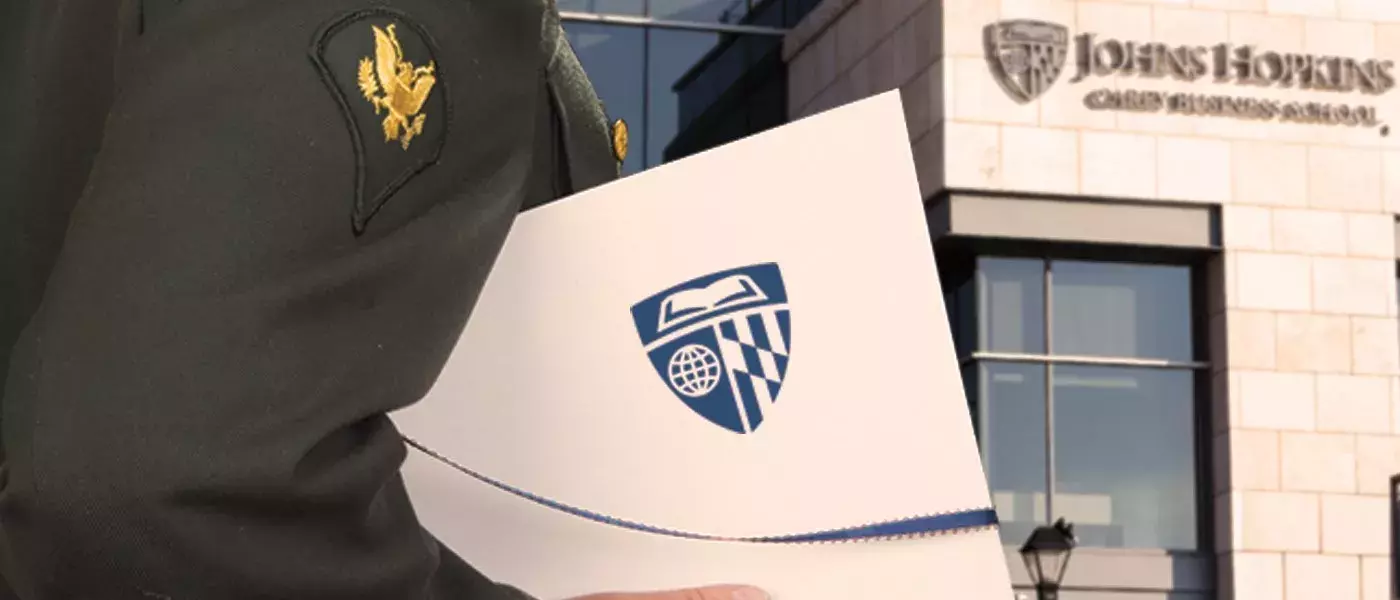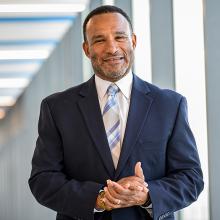Active military and veteran students
Active military and veteran students

Student Experience
VET Academy
Johns Hopkins is proud to support our nation’s military by providing a premier business education during and after service.
At Carey, we deeply appreciate the sacrifices made by members of the armed forces. We proudly provide special support for former and active military members seeking to transition to business school.
The veterans support team at Carey brings together resources for students who are active-duty service members, veterans, reservists, guard members, and family members who intend to use Veterans Affairs education benefits.

Andrew Sanchez is a full-time MBA candidate at Johns Hopkins Carey Business School and a former U.S. Navy Nuclear Submarine Officer with over eight years of leadership and operational experience. He has worked on strategic projects in biotech and consulting and is passionate about leveraging business to drive innovation in healthcare and technology. Andrew currently serves as President of the Student Veterans of America chapter at Carey, where he supports veteran students through mentorship, community-building, and professional development initiatives.
Andrew Sanchez (MBA candidate)
Types of assistance at Carey
-
Carey Business School proudly participates in the Yellow Ribbon Program. The Yellow Ribbon Program is a voluntary agreement between Carey and the Department of Veterans Affairs to waive a portion of tuition costs that exceed the national maximum Post 9/11 GI Bill® reimbursement. The Veterans Administration will match the amount of the waiver provided by Carey and contribute that to your tuition.
Carey Business School offers unlimited annual benefits through the Yellow Ribbon Program, with no cap on the number of recipients or the amount of support provided. This ensures that all qualifying veterans receive maximum financial assistance. Please visit the Department of Veteran Affairs for full eligibility guidelines.
-
Through the Post-9/11 GI Bill®, Veterans Affairs will pay a percentage of a student's net cost for tuition and fees (after the application of any other tuition-specific support) to Carey Business School and disburse any eligible housing and book payments directly to students. The amount of payment is governed by the student’s eligibility as established by the VA.
Please visit the Office of Student Enrollment and Account Management’s website to learn more about the Post-9/11 GI Bill®.
-
As a thank you for your service, the $100 nonrefundable application fee is waived for all active duty and veteran applicants. To request the waiver, please contact the admissions recruiter for the program you are applying to before submitting your application.
-
Johns Hopkins regularly updates the types of assistance available to active military and veteran students. Stipends, additional military tuition assistance, and MD National Guard opportunities are available for Carey students. External military scholarships are also available through various external organizations, offering scholarships, grants, and loans. Details on each additional type of assistance can be found on the Johns Hopkins Office of Student Enrollment and Account Management’s Veterans Affairs website.
Veteran Buddy System: *lead buddy - Carey Buddy System - Lead Buddy Application
*new student/mentee – COMING SOON
Upcoming Events
Navigating Your Transition: Military to MBA/MS Success at Johns Hopkins
Tuesday, October 21, 2025 at 6:00 PM until 7:00 PM
Carey on the road and coffee chats
Carey's Admissions team is constantly traveling across the country–and the globe–to visit our prospective students. Join members of the admissions team on the road or over coffee to learn more about your options as an active-duty military or veteran student at Carey. Be sure to check this webpage regularly–Carey's Admissions team might be coming to a location near you!
VET Academy
Carey Business School’s Executive Education offers an innovative program designed to prepare senior military leaders for high-impact civilian careers. VET Academy bridges the gap between military leadership and the corporate world, equipping participants with the skills, knowledge, and networks to thrive as executives in top-tier organizations. The program focuses on unlocking the full potential of military leaders, empowering them to drive results, lead innovation, and shape the future of their organizations.
Networking opportunities for military students
Carey student veteran network
Student Veterans of America is a student-led organization that provides military and veteran students the opportunity for networking, career development, transitional assistance, adventure trips, and service opportunities. The student veteran network collaborates with various community and educational organizations in Baltimore and the Washington, D.C. area including FourBlock, 6th Branch, the Mission Continues, and Team River Runner.
Contact Carey.Students@jhu.edu for more information for more information or join the JHU Veterans Connection Group on LinkedIn to connect with other veterans at JHU.
Veteran alumni
Join the Johns Hopkins Veterans Affinity Network to stay in touch with veteran alumni across all Johns Hopkins schools and programs. Learn more about our veterans affinity network.
Carey Veterans Buddy System
Carey Veterans Buddy System
The Carey Veteran Buddy System pairs incoming and current students to help you navigate this new terrain. They will hold online social and professional events, in-person leadership programming in honor of Veteran’s Day, and support connecting students to many resources, networks, and programming in the Hopkins community.
- Interested students should contact Andrew Sanchez
Carey Vet LinkedIn photos
Army veteran Tyson Patrick (MBA ’21) was able to embrace the Carey community before taking classes in the full-time MBA program. Hear more about the support he received from Carey as he transitioned from the military to an MBA and how he is now leveraging his strong connections to grow his network.
Getting started
New students
For important details regarding VA Education Benefits, please visit JHU’s Veteran Affairs website. For the quickest response, please submit all questions or submission of eligibility status to JHU’s Veteran Benefits Inquiry.
Current students
Students are certified on a per-semester basis, meaning benefits do not automatically roll over from one semester to another. Students must complete the Third-Party Payer agreement each semester in order to request certification. The agreement can be found on the billing tab in your SIS account. Please select VA and the Chapter that you are using for that particular semester. For example, VA Chapter 33. Next, read the student acknowledgment section, check the box to acknowledge, sign, and submit.
Students utilizing VA education benefits must immediately let their school certifying official know of any change in their enrollment status or program that might affect the amount of their payment from the VA. Submit your information to JHU’s Veteran Benefits Inquiry.
Questions? Please reach out to us.

Jennifer Lampton
Assistant Director of Admissions
Admissions
Johns Hopkins Carey Business School
Office: 410-855-4122
jlampton@jhu.edu
Schedule a Meeting at: https://go.oncehub.com/JenniferLampton

Roger Williams
Director
Diversity, Equity, Inclusion and Belonging
Community and Corporate Partnerships
Student Resources
Office of Student Affairs
Johns Hopkins Carey Business School
Office: 410.234.9277
r.williams@jhu.edu
For benefit-specific questions, please submit a veteran inquiry here to connect with a team member.
